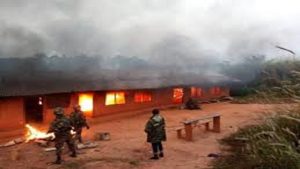
Lagos — The expansion of industrial-scale cobalt and copper mines in the Democratic Republic of the Congo (DRC) has led to the forced eviction of entire communities and grievous human rights abuses including sexual assault, arson and beatings.
In a report, Powering Change or Business as Usual?, Amnesty International and the DRC-based organisation Initiative pour la Bonne Gouvernance et les Droits Humains (IBGDH), detail how the scramble by multinational companies to expand mining operations has resulted in communities being forced from their homes and farmland.
“The forced evictions taking place as companies seek to expand industrial-scale copper and cobalt mining projects are wrecking lives and must stop now,” said Agnès Callamard, Amnesty International’s Secretary General.
“Amnesty International recognizes the vital function of rechargeable batteries in the energy transition from fossil fuels. But climate justice demands a just transition. Decarbonizing the global economy must not lead to further human rights violations.
“The people of the DRC experienced significant exploitation and abuse during the colonial and post-colonial era, and their rights are still being sacrificed as the wealth around them is stripped away.”
Growing demand for so-called clean energy technologies has created a corresponding demand for certain metals, including copper, and cobalt, which is essential for making most lithium-ion batteries. These are used to power a wide range of devices including electric cars and mobile phones. The DRC has the world’s largest reserves of cobalt, and the seventh largest reserves of copper.
The average electric vehicle battery requires more than 13kg of cobalt, and a mobile phone battery about 7g. Demand for cobalt is expected to reach 222,000 tonnes by 2025, having tripled since 2010.
Donat Kambola, president of IBGDH, said: “People are being forcibly evicted, or threatened or intimidated into leaving their homes, or misled into consenting to derisory settlements. Often there was no grievance mechanism, accountability, or access to justice.”
Candy Ofime and Jean-Mobert Senga, Amnesty International researchers and co-authors of the report, said: “We found repeated breaches of legal safeguards prescribed in international human rights law and standards, and national legislation, as well as blatant disregard for the UN Guiding Principles on Business and Human Rights.”
To produce Powering Change or Business as Usual? Amnesty International and IBGDH interviewed more than 130 people at six different mining projects in and around the city of Kolwezi, in the southern province of Lualaba, during two separate visits in 2022.
Researchers reviewed documents and correspondence, photographs, videos, satellite images and company responses. Findings at four sites are included in the report and abuses at three sites, involving forced evictions, are recounted below. At the fourth site, Kamoa-Kakula, the report found evidence of inadequate resettlement. Responses from the companies named in the report can be accessed here.
Homes demolished as a mine expands into a city
In the heart of the city of Kolwezi long-established communities have been destroyed since a vast open-pit copper and cobalt mine was reopened in 2015.
The project is operated by Compagnie Minière de Musonoie Global SAS (COMMUS), a joint venture between Zijin Mining Group Ltd, a Chinese company, and Générale des Carrières et des Mines SA (Gécamines), the DRC state mining company.
The affected neighbourhood of Cité Gécamines is home to about 39,000 people. The houses are typically multi-roomed and set in walled compounds with running water and electricity. There are schools and hospitals nearby.
Since mining activities resumed, hundreds of residents have been told to leave, or have already had to move. Communities have not been adequately consulted and plans to expand the mine have not been made public. Some residents found out their houses were to be demolished only after red crosses appeared on their properties.
Edmond Musans, 62, who had to dismantle his home and leave, said: “We did not ask to be moved, the company and the government came and told us, ‘There are minerals here.’”
Evictees said compensation offered by COMMUS was inadequate to buy them equivalent homes. As a result many have had to move to properties without running water or reliable power on the outskirts of Kolwezi, experiencing a shocking fall in their standard of living. They have no effective means of appeal or redress.
One former resident said: “I had a large house, with electricity, water…Now, I have a small house that was all I could afford with the compensation…we have to drink water from wells … almost no electricity.”
Cécile Isaka, another former resident, said blasting to enlarge the mine caused cracks so large she feared her home would collapse. With no other viable option, she accepted the compensation offer and dismantled her damaged property in 2022 so she could reuse the bricks to rebuild elsewhere.
Edmond Musans helped form a committee to represent the interests of more than 200 households at risk of eviction, seeking higher compensation from COMMUS. The committee has shared its grievances with provincial authorities, to no avail.
COMMUS told Amnesty International that it aimed to improve communication with stakeholders.
Houses burned, and residents injured
Near the site of the Mutoshi project, run by Chemicals of Africa SA (Chemaf), a subsidiary of Chemaf Resources Ltd., which is headquartered in Dubai, interviewees described how soldiers burned down a settlement called Mukumbi.
Ernest Miji, the local chief, said that in 2015, after Chemaf acquired the concession, three representatives of the company, accompanied by two police officers, came to tell him it was time for Mukumbi’s residents to move away. He said the representatives visited four more times.
Recalling one of the visits, Kanini Maska, a former resident, said: “Chemaf’s representative told us: ‘You need to leave the village now.’ We asked him: ‘Where would we go? It is … where we’re raising our children, where we’re farming land and where our kids are registered to go to school.’”
Interviewees said soldiers of the Republican Guard, an elite military force, arrived one morning and began burning houses, and beat villagers who tried to stop them.
“We weren’t able to retrieve anything,” said Kanini Maska, 57. “We had nothing to survive on, and spent nights in the forest.”
One girl, who was two at the time and we have chosen not to name, was severely burned, resulting in life-altering scarring. Her uncle said the mattress she was lying on had caught fire.
Satellite images support accounts that Mukumbi – which had once comprised about 400 structures, including a school, a health facility, and a church – was destroyed by 7 November 2016.
Following protests, in 2019 Chemaf agreed to pay via the local authority US$1.5 million, but some former residents received as little as US$300. Chemaf denies any wrongdoing, liability, or involvement in the destruction of Mukumbi, or directing military forces to destroy it.
Bulldozed crops and sexual assault
Near Kolwezi, a subsidiary of Eurasian Resources Group (ERG), which is headquartered in Luxembourg and whose largest shareholder is the government of Kazakhstan, runs the Metalkol Roan Tailings Reclamation (RTR) project.
Twenty-one farmers, part of a collective growing crops on the fringes of the concession near the village of Tshamundenda, said that in February 2020, without any meaningful consultation or notice of eviction, a detachment of soldiers, some with dogs, occupied the area while the fields they had tended were bulldozed.
One woman, who we are calling Kabibi to protect her identity, described how she was trying to harvest her crops before they were destroyed when she was seized by three soldiers and gang raped, while other soldiers watched.
Kabibi, who was two months pregnant, required medical treatment. She told her family and village chief about the incident, but was too afraid to report it to Metalkol, or the local authorities. Her baby was later delivered safely.
Kabibi told researchers: “I’m a widow, I can’t afford to register my children in school … To date, I don’t have a job or other sources of income. I wander, from home to home, to find something to eat for my kids.”
The farmers have repeatedly protested and advocated for compensation but have not been offered effective remedy.
In response, ERG said it had no control over the deployment of soldiers. It said the government determined the farmers’ collective had received compensation from a previous mine operator, which the farmers deny.
Stop forced evictions
The report urges the DRC authorities to immediately end forced evictions, instigate an impartial commission of inquiry, and strengthen and enforce national laws related to mining and evictions in line with international human rights standards.
The authorities have carried out or facilitated forced evictions and failed in their obligation to protect people’s rights, including those enshrined in the International Covenant on Economic, Social and Cultural Rights and UN Guiding Principles on Business and Human Rights. The military must never be involved in evictions.
The companies’ claims that they adhere to high ethical standards have been shown to be hollow. They have a responsibility to investigate the abuses identified, provide effective redress, and act to prevent further harms. All companies should ensure their operations do not harm frontline communities.
Donat Kambola of IBGDH said: “The international mining companies involved have deep pockets and can readily afford to make the changes necessary to safeguard human rights, establish processes that improve the lives of people in the region, and provide remedy for the abuses suffered.”
Agnès Callamard of Amnesty International said: “The Democratic Republic of the Congo can play a pivotal role in the world’s transition from fossil fuels, but the rights of communities must not be trampled in the rush to mine minerals critical to decarbonizing the global economy.”


